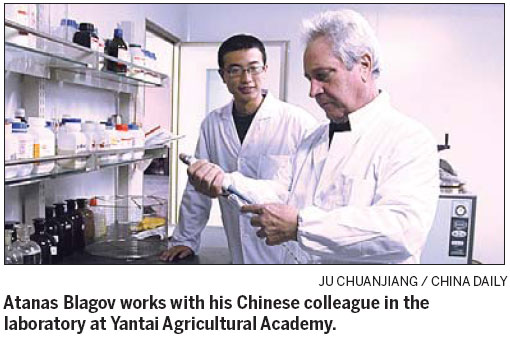Bulgarian shares the fruit of his labor with China
Updated: 2013-01-10 07:38
By Han Bingbin in Yantai, Shandong (China Daily)
|
||||||||

My China Dream | Atanas Blagov
While he was preparing to rush home to Bulgaria for Christmas, Atanas Blagov had an unexpected and unforgettable experience.
In early December, the 66-year-old fruit cross breeding expert, who has more than eight new apple breeds to his credit back in Bulgaria, was among 20 foreign experts who were invited to offer suggestions to fuel the country's progress in an official meeting with Chinese top political leader Xi Jinping.
After his impressive talk at a pre-meeting with the State Administration of Foreign Experts Affairs, he was invited to deliver a speech during the meeting with Xi at the Great Hall of the People.
But that's no challenge for him. Since 2001, the botanist has been working for months each year with the fruit research institute in Yantai, China's best-known apple producing locality.
Barely speaking any Chinese initially, he now considers himself to be half a Yantai native: He loves local food and is also a qualified local poker player.
Blagov fondly recalls his first impression of China in 2001, when he came to attend a fruit expo in Yantai. He found Yantai to be an amiable city, which is also very clean. The climatic condition is also surprisingly similar to his home country, and is suitable for fruit production.
Therefore, when Jiang Zhongwu, vice-dean of Yantai Agricultural Academy, invited him for joint research projects, he jumped at the opportunity immediately as he believed the collaboration would benefit farmers in both countries.
It proved to be a fruitful decade. By experimentally cross breeding apple varieties, Blagov has developed 36 new and good quality apple varieties with strong anti-virus features. Some of the apples are expected to enter the market as China-branded apples in the near future.
"When people talk about Yantai apples, they mean hongfushi. But Blagov has helped to enrich our apple varieties, making it possible for product upgrading in the near future. That'll enhance our competitiveness on the global stage," Jiang says.
The fruits of Blagov's labor go beyond tasty apples.
Jiang says Yantai's hongfushi apples have weak resistance against certain virus and require pesticide, resulting in added labor and monetary costs. Pesticide also raises food safety concerns.
It was Blagov, Jiang adds, who introduced the concept of "virus-free planting".
Many of his cross breeds have proven to have stronger resistance against viruses, and are expected to largely increase apple production.
To attain first-hand information for his cross-breeding experiments, Blagov is often seen walking in the apple gardens with a notebook or chatting up the farmers.
His colleague Song Laiqing calls him "a restless guy". Whenever Blagov is in China, Song says, his first request is to go to the apple gardens.
Song is very impressed by Blagov's sharp eyes, trained by his decades of experiences in fruit planting. He says Blagov can tell a seedling's productivity and virus resistance by its appearance. Song feels that the botanist's most praiseworthy attribute is his willingness to share his knowledge with his Chinese colleagues.
In the past decade, he has given numerous lectures to fruit researchers in the city. He organizes regular training sessions for young researches at Yantai Agricultural Academy. He teaches Chinese farmers how to make grape and cheery wines.
Believing China and Bulgaria have the same fruit research aim, Blagov initiated a talent exchange project between Yantai Agricultural Academy and Institute of Agriculture-Kyustendil, Bulgaria, in 2008.
"To be a researcher, it doesn't mean working only for yourself. You are obliged to share it with people who need to use them," Blagov says.
hanbingbin@chinadaily.com.cn
(China Daily 01/10/2013 page18)

 In Photos: 7.0-magnitude quake hits Sichuan
In Photos: 7.0-magnitude quake hits Sichuan
 Li Na on Time cover, makes influential 100 list
Li Na on Time cover, makes influential 100 list
 FBI releases photos of 2 Boston bombings suspects
FBI releases photos of 2 Boston bombings suspects
 World's wackiest hairstyles
World's wackiest hairstyles
 Sandstorms strike Northwest China
Sandstorms strike Northwest China
 Never-seen photos of Madonna on display
Never-seen photos of Madonna on display
 H7N9 outbreak linked to waterfowl migration
H7N9 outbreak linked to waterfowl migration
 Dozens feared dead in Texas plant blast
Dozens feared dead in Texas plant blast
Most Viewed
Editor's Picks

|

|

|

|

|

|
Today's Top News
Live report: 7.0-magnitude quake hits Sichuan, heavy casualties feared
Boston suspect cornered on boat
Cross-talk artist helps to spread the word
'Green' awareness levels drop in Beijing
Palace Museum spruces up
First couple on Time's list of most influential
H7N9 flu transmission studied
Trading channels 'need to broaden'
US Weekly

|

|







